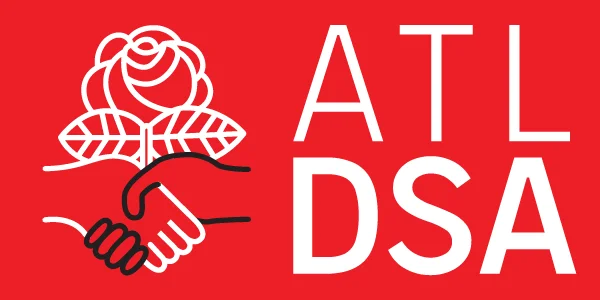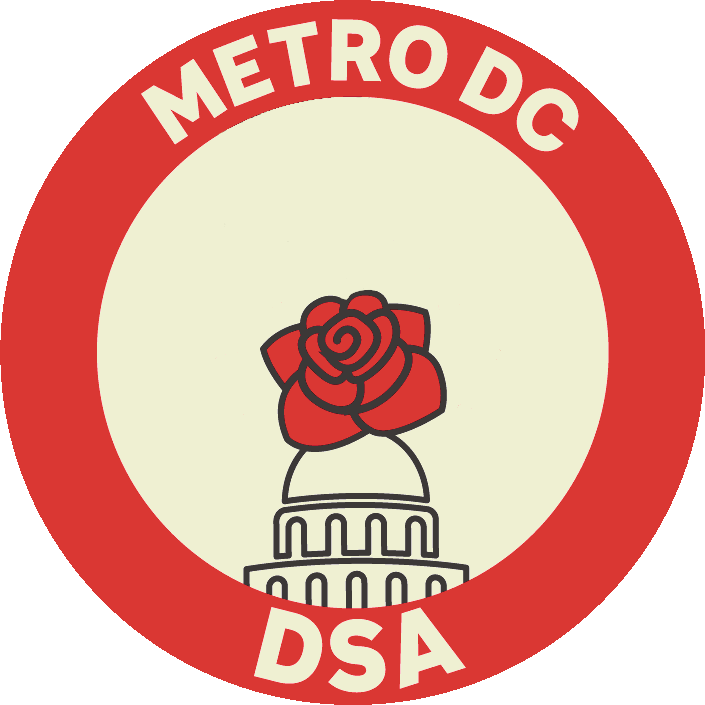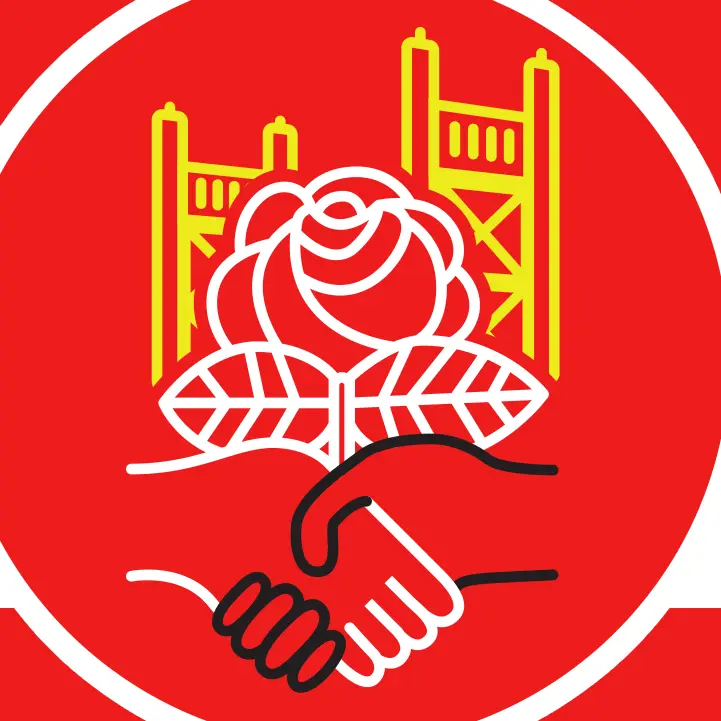
Antifascist Mobilization


Metro Atlanta DSA guide to Georgia Referendums!
This November, Georgia residents will vote on two constitutional amendments and a referendum. Many of our members have requested a guide to help clarify these. Two members of MADSA’s electoral working group, Eli and Jim, did the research and put together a guide to explain the ballot initiatives, including a list of pros and cons of each from a socialist perspective. Two additional referendums from the Dekalb and Gwinnett county ballots are described as well.
In addition, MADSA has endorsed Zan Fort for Georgia’s 39th Senate District Special Election! Our work will continue beyond November to build a movement that fights for working class interests, but in elections and outside them. Join MADSA if you want to be involved!
If you have any questions or concerns about our voter guide or larger electoral work, feel free to reach out at electoral@madsa.ga

We're All We've Got: Eco-Socialist Solidarity [Podcast Exclusive!]
When climate collapse strikes home, we’re all we’ve got. On today’s show, we’re learning about two separate but interconnected climate struggles.
After getting slammed by two hurricanes just several weeks apart, residents of SW Louisiana have been left to take care of each other and their communities. We'll talk with Megan Romer of SW Louisiana DSA on how people can help from afar and how no matter where we are we can prepare to respond to the many crises we face, with mutual aid and solidarity.
We’ll also discuss an ongoing climate struggle right here in our own backyard -- the fight to stop a new fracked gas pipeline in North Brooklyn, where communities are stepping up to stop construction by putting their bodies on the line.
Did the message of this show hit home for you? Rally for Public Power and stop National Grid! The rally will be held Thursday 10/22 at 9:30am, outside of National Grid headquarters in downtown Brooklyn (1 Metrotech Center).
For updates on the North Brooklyn Pipeline, follow @frackouttabk on Instagram and @nonbkpipeline and @BVilleGreen on Twitter.
Support the comrades in SW Louisiana and follow along with their specific requests at @DSASWLA.


How Faith Traditions Can Strengthen Socialist Movements w/ Bhaskar Sunkara & Rev. Andrew Wilkes


Nov. 3, 2020 Voter Guide
Hello and welcome to the 2020 San Antonio Democratic Socialists of America Voters Guide.
There are no San Antonio DSA or National DSA endorsed candidates on this guide. The candidates in this guide are recommended by SADSA’s Local Council, but none were endorsed by the chapter. Our chapter votes on formal endorsements and candidates/propositions must seek the endorsement of SADSA. Several community members have reached out to SADSA for a voters guide, so we have created one. It is by no means expansive and does not cover every race in our area, but we hope this can help inform your decisions if you’re looking to a socialist organization for electoral advice. Our struggles go beyond the ballot box, but it is a site of struggle that we cannot withdraw from,we can take it back if we fight together. Join San Antonio DSA.
We know during a presidential year, much of the attention focuses on the top of ticket, but local and state races arguably have just as much impact on our daily lives. Neither presidential candidate nor party represents the interest of working people. Unfortunately for many state and local voters, neither do the candidates running for these positions either. We chose to opt for a recommendation on more local races, as these races are less often highlighted, and on toss up or close races. If a candidate is in a solid district, running unopposed, or opposed via third party only, we opted to not recommend.
If you have any questions or comments, please do not email SanAntonioDSA@gmail.com.

Update on WBAI and Red Wave [Podcast Exclusive!]


DSA Organizes to Protect Neighbors in Need from Power Disconnections
Montgomery County DSA Says: “The People, United, Will Fight to Keep the Lights On”
(SILVER SPRING, MD) — Montgomery County DSA’s Power for the People campaign is providing direct aid to neighbors who are unable to pay their energy bills. The campaign has donated $3,000 so far, protecting nine low-income households from gas and electricity disconnections, and is continuing to raise funds through an Action Network campaign.
Maryland’s statewide ban on power disconnections expires on November 15. Governor Hogan stopped extending the moratorium at the request of Pepco and other utility companies, and he has no plans to offer real relief to struggling families. Montgomery County DSA stands in solidarity with our neighbors who will lose access to gas and electricity in the coming weeks.
While Pepco’s parent company, Exelon, continues to pay quarterly dividends to shareholders, the coronavirus pandemic has emptied families’ pocketbooks. In June, 150,000 Pepco customers in Maryland’s DC suburbs were more than 60 days behind on their energy bills. Meanwhile, the hurdles to existing assistance programs are even higher than before. In-person appointments are scarce. Signup events have been canceled. Additionally, Maryland’s undocumented residents are not eligible for government-run energy assistance programs.
Power for the People fills these gaps by providing a simple request form in English, Spanish, and Amharic that does not ask for proof of income. 100% of donations raised through the Action Network campaign are credited to recipients’ Pepco balances. One of the campaign’s first recipients, Kathy M., had this to say: “Your donation helps me in ways that you can’t imagine. In what seems a lifetime ago, I joyfully gave of myself in service to others. However, life circumstances can change your existence in a nanosecond. Your gift has given me hope that there will be a better day.”
The campaign has set a goal of raising $5,000 in additional funds to meet all the requests that have come in. Power for the People co-organizer Sarah Brand said, “In an economic crisis, mutual aid is more important than ever. Our neighbors need to stay warm this winter, and students need reliable power to attend classes. I encourage anyone who can help to pitch in.”
The post DSA Organizes to Protect Neighbors in Need from Power Disconnections appeared first on Metro DC Democratic Socialists of America.


MADSA votes to endorse Zan Fort
The Metro Atlanta Democratic Socialists are excited to announce their endorsement of Zan Fort for Georgia’s 39th Senate District.

What is the 39th Senate District race?
With Nikema Williams leaving this seat to fill John Lewis’ former seat, District 39 residents will vote on November 3rd to fill her seat in the 39th district.
Early voting in Georgia begins October 12.
What is the 39th district?
District 39 spans west Atlanta (view a map here). Visit your GA My Voter page to confirm your district.
Why are we supporting Zan Fort?
Zan is a lifelong Atlanta resident with a long family history of union membership and ties to the Democratic Socialists of America. Zan’s platform includes progressive policies such as:
- A $15 minimum wage
- Medicare for All (pushing to expand Medicaid in GA and protecting the ACA until we can pass Medicare for All federally)
- An extended moratorium on COVID-19 evictions
- Banning violent police practices such as chokeholds, no-knock warrants, and ending qualified immunity.

Get involved by joining #local_elections_wg on Slack (or email membership@madsa.ga if you don’t have Slack access yet), or look for the latest text banking and canvassing events in our newsletter!

The End of the World, As We Know It [Podcast Exclusive]


Proposition 22 & its DISCONTENTS
October 06, 2020 22:23
by Ian Lee
A spectre is haunting the working class – the spectre of Proposition 22. All the powers of the center-Left and Left have entered into a holy alliance to exorcise this spectre: the Service Employees International Union, the Democratic Socialists of America, and even much of the Democratic Party (including Joe Biden), etc.
We have a real shot at defeating Proposition 22. But it is by no means certain. The most recent poll I’m aware of, coming out of UC Berkeley and reported in the LA times, showed that 39% of likely voters will side with the Gig Companies (Yes on 22), 36% will side with the actual drivers (No on 22), and 25% are still undecided – with a 2% margin of error. So we can win – and live to fight another day, building a movement of hundreds of thousands of drivers to form the largest, most consequential Labor Union in California history. Or we can lose – and set workers’ rights back by decades. But it will be up to us and the conversations we have with one another. As the poll showed, the drivers are neck and neck with the gig companies, and so indeed, every conversation about Proposition 22 is going to matter to decide the fate of the development of neoliberal capitalism.
That is extreme language, I am aware, but I do not believe it is hyperbole. I have been organizing rideshare and delivery drivers for a year now, and I really do believe this: Proposition 22 represents a fundamental paradigm shift within the development of neoliberal capitalism.
Never in my career have I received so many DMs from people, period. People are confused about Proposition 22, many of them Leftists who are accidentally siding with the Gig CEOs! It’s understandable – Uber, et al., have spent $183 million so far in what is amounting to the most expensive ballot proposition in California history. Every gig driver and gig customer has received push notifications on their phones urging them to Vote Yes on Proposition 22. As Louis Althusser might say, “Dannnngggg, the Ideological State Apparatus is in full swing, bro.”
My hope is that I can answer the most common questions I get asked about Prop 22 in this post.
1. OK, so what is Proposition 22? What is its history?
In January 2020, the California State Legislature passed Assembly Bill 5 (AB 5). AB 5 codified into State Law a California Supreme Court Case called Dynamex. Basically, it gave a three-prong test to determine if an “independent contractor” can actually be classified as an independent contractor under California Labor Law: (a) that the worker is free from the control and direction of the hirer in connection with the performance of the work, both under the contract for the performance of such work and in fact; (b) that the worker performs work that is outside the usual course of the hiring entity’s business; and (c) that the worker is customarily engaged in an independently established trade, occupation, or business of the same nature as the work performed for the hiring entity.
That may seem like a bunch of legal mumbo-jumbo, but to the Gig CEOs, it was really Bad News Bears. Anyone with common sense knows (a) that Uber Drivers are actually controlled by Uber’s algorithms, (b) that rideshare driving is CENTRAL to Uber’s business model, and (c) that most full-time drivers would not otherwise be independently driving people around if it weren’t for the existence of Uber. And so under all three tests, Uber, Lyft, Doordash, Instacart, etc., would have to classify their drivers as employees.
As employees, drivers would be entitled to things like: a basic minimum wage, benefits (after 30 hrs/week), sick leave, unemployment insurance, and most importantly, the Right to Form a Union.
CEOs be CEOs, man. They don’t want to give workers that stuff, and so since January the Gig Companies have actively been disobeying the law and illegally classifying gig drivers as independent contractors. This has been the subject of – I don’t even know how many lawsuits at this point, but countless lawsuits from drivers, lawsuits from the State of California, and lawsuits from many city attorneys in California.
CEOs don’t give up. Nota Bene: the Gig CEOs created Proposition 22, which would re-classify drivers as independent contractors.
That’s what Proposition 22 is really about.
2. But don’t Gig CEOs actually care about drivers? I heard that Proposition 22 helps drivers?
The way I like to think about it is this. Uber, etc., are spending $183 million to pass Prop 22. It is the most expensive ballot proposition in California history. If Uber really wanted to improve work conditions, pay, benefits of drivers, as they say is the point of their Prop, then they could do that tomorrow. They’re a corporation. They could raise wages tomorrow. No, what Prop 22 is really about is DECREASING wages (compared to employee status), avoiding state/local/worker lawsuits, and NOT PAYING TAXES to the State. And look, I get it, corporations are corporations: they want to maximize profits. But maximizing profits means decreased wages, unfortunately. Bottom line, Uber doesn’t actually care about drivers.
Here’s a case example: when you factor in gas/mileage, Lyft drivers often do not even make minimum wage. So for these Lyft drivers who are not even making minimum wage, you know what Lyft started to do at the beginning of the pandemic? Charge drivers for PPE! Can you imagine that? Charging drivers for PPE when they don’t even make minimum wage.
But that’s their business model: Lyft has taken the false position that drivers are independent contractors, and so under this logic, of course they would charge their drivers for PPE.
But we all know, that’s sick – literally. As a campaign, we received calls from drivers scared about their access to food, scared about housing insecurity, scared about their health, and even a few drivers who expressed suicidal ideation.
These were drivers – many of them – who sleep in their cars and work 60-80 hrs a week, and still barely make ends meet. And then – to be CHARGED for PPE? These gig corporations do not care about drivers.
3. If Proposition 22 passes, won’t drivers lose their flexibility?
According to the State Attorney General, the City Attorney of San Francisco, the City Attorney of San Diego, and the City Attorney of Los Angeles, as well as the State Labor Commissioner – they’ve all said that Uber is lying about schedules/flexibility. There are plenty of employees, even Union Employees (such as day laborers), that work flexible schedules. There is nothing about being an employee that mandates fixed schedules. Uber CAN implement schedules, but that would be their decision. And that’s PRECISELY why drivers are organizing a Union – to have collective power and a seat at the table to say NO to fixed schedules.
4. I’m a True Independent Contractor and so I’m scared of opposing Prop 22…
I understand why it would be confusing! As an independent contractor myself (videography/photography), I understand your confusion and fear. The reality is that the reason Uber wants drivers to be independent contractors is so (a) they can pay the drivers less and (b) independent contractors are not allowed to form legally recognized unions.
AB 5 did have unintended effects on artists and true independent contractors. Through AB 2257, artists and true independent contractors are no longer effected. AB 5 has been fixed. But Prop 22 doesn’t have anything to do with true independent contractors. Prop 22 deals with (this is language from the actual Prop), “App-based rideshare and delivery platforms to transport passengers and deliver, food, groceries, and other goods as a means of earning income.”
5. What if Uber, et al., leave California?
California is about 15% of their entire revenue. Do you think Uber would leave that much revenue behind? Look, the day they threatened to leave California was the day before a State Appeal’s Judge was deciding on an injunction on Uber/Lyft… it was entirely, entirely a political move for the media.
6. You’re being intense, Ian. OK, I get it, I get it. No on Prop 22. But why are you subtly quoting Freud, Marx, Althusser, and saying stuff like “Proposition 22 represents a fundamental paradigm shift within the development of neoliberal capitalism”?
Look, I get it. I’m sort of an intense guy.
But Proposition 22 does indeed represent a fundamental paradigm shift within the development of neoliberal capitalism.
First of all, if Prop 22 passes, it will require a 7/8th majority in the State Legislature to overturn. It is truly, truly a poison pill, and so if Prop 22 passes, it will set a precedent for Gig Workers in this country for Decades – setting a precedent that Gig Workers do not deserve a basic minimum wage, benefits, sick pay, unemployment insurance, and the Right to Form a Union.
Before the pandemic, there was an estimate of 400,000 rideshare and delivery drivers in California. But it won’t stop there. More and more, capitalists – in the pursuit of profit – want to convert workers to independent contractors. Uber is right now looking to expand independent contracting to even more sectors – the “Uberfication” of all work. Per Uber’s very own website, the Industries that Uber will be expanding to first with an army of independent contractors are: hospitality, real estate, consulting and financial, and government. These armies of independent contractors will be used for: sales and marketing, events, facilities, executive assistants, and procurement.
This goes way deep into even our ability to understand capitalism. As we recover from this pandemic, Gig CEOs will try to use the recovery as an opportunity to fundamentally shift the structural conditions of labor relations in a way that I believe will result in a fundamental epistemological break, in the same way that the creation of Urban Cities centered around Industrial Production in the hyper-speed rise of Capitalism in Marx’s time created a fundamental epistemological break with the theory of before.
We are in for a world of hurt if Prop 22 passes. But if we defeat Prop 22 – and the polling says we can, if we have the conversations we need to have with our friends, families, and neighbors – we have the opportunity to create a mass movement of Gig Workers and form the most consequential Labor Union of our lifetimes.
Vote No on Prop 22. Way more importantly: Organize.